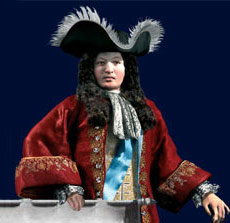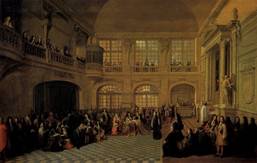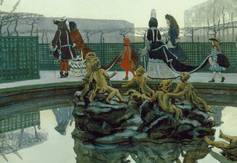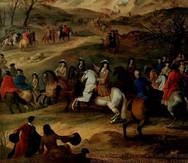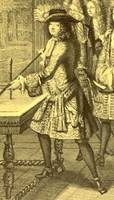His natural talents were below mediocrity, but he had a mind capable of improvement, of receiving polish, of assimilating what was best in the minds of others without slavish imitation, and he profited greatly throughout his life from having associated with the ablest and wittiest persons, of both sexes, and of various stations. He entered the world (if I may use such an expression in speaking of a King who had already completed his twenty-third year), at a fortunate moment, for men of distinction abounded. His Ministers and Generals at this time, with their successors trained in their schools, are universally acknowledged to have been the ablest in Europe, for the domestic troubles and foreign wars under which France had suffered ever since the death of Louis XIII had brought to the front a number of brilliant names, and the Court was made up of capable and illustrious personages.... Glory was his passion, but he also liked order and regularity in all things, he was naturally prudent, moderate, and reserved; always master of his tongue and his emotions. Will it be believed? he was also naturally kind-hearted and just. God had given him all that was necessary for him to be a good King, perhaps also to be a fairly great one. All his faults were produced by his surroundings. In his childhood he was so much neglected that no one dared go near his rooms. He was often heard to speak of those times with great bitterness, he used to relate how, through the carelessness of his attendants, he was found one evening in the basin of a fountain in the Palais-Royal gardens....
His Ministers, generals, mistresses, and courtiers soon found out his weak point, namely, his love of hearing his own praises. There was nothing he liked so much as flattery, or, to put it more plainly, adulation; the coarser and clumsier it was, the more he relished it. That was the only way to approach him; if he ever took a liking to a man it was invariably due to some lucky stroke of flattery in the first instance, and to indefatigable perseverance in the same line afterwards. His Ministers owed much of their influence to their frequent opportunities for burning incense before him....
His mind was occupied with small things rather than with great, and he delighted in all sorts of petty details, such as the dress and drill of his soldiers, and it was just the same with regard to his building operations, his household, and even his cookery. He always thought he could teach something of their own craft even to the most skilful professional men, and they, for their part, used to listen gratefully to lessons which they had long ago learnt by heart. He imagined that all this showed his indefatigable industry; in reality, it was a great waste of time, and his Ministers turned it to good account for their own purposes, as soon as they had learnt the art of managing him, they kept his attention engaged with a mass of details, while they contrived to get their own way in more important matters.
His vanity, which was perpetually nourished - for even preachers used to praise him to his face from the pulpit - was the cause of the aggrandisement of his Ministers. He imagined that they were great only through him, mere mouthpieces through which he expressed his will, consequently he made no objection when they gradually encroached on the privileges of the greatest noblemen. He felt that he could at any moment reduce them to their original obscurity; whereas, in the case of a nobleman, though he could make him feel the weight of his displeasure, he could not deprive him or his family of the advantages due to his birth. For this reason he made it a rule never to admit a seigneur to his Councils, to which the Duke de Beauvilliers was the only exception....
But for the fear of the devil, which, by God's grace, never forsook him even in his wildest excesses, he would have caused himself to be worshipped as a deity. He would not have lacked worshippers....
He availed himself of the frequent festivities at Versailles, and his excursions to other places, as a means of making the courtiers assiduous in their attendance and anxious to please him, for he nominated beforehand those who were to take part in them, and could thus gratify some and inflict a snub on others. He was conscious that the substantial favours he had to bestow were not nearly sufficient to produce a continual effect, he had therefore to invent imaginary ones, and no one was so clever in devising petty distinctions and preferences which aroused jealousy and emulation. The visits to Marly later on were very useful to him in this way; also those to Trianon, where certain ladies, chosen beforehand, were admitted to his table. It was another distinction to hold his candlestick at his coucher, as soon as he had finished his prayers he used to name the courtier to whom it was to be handed, always choosing one of the highest rank among those present....
Not only did he expect all persons of distinction to be in continual attendance at Court, but he was quick to notice the absence of those of inferior degree, at his lever, his coucher, his meals, in the gardens of Versailles (the only place where the courtiers in general were allowed to follow him), he used to cast his eyes to right and left; nothing escaped him, he saw everybody. If any one habitually living at Court absented himself he insisted on knowing the reason; those who came there only for flying visits had also to give a satisfactory explanation; any one who seldom or never appeared there was certain to incur his displeasure. If asked to bestow a favour on such persons he would reply haughtily: "I do not know him", of such as rarely presented themselves he would say, "He is a man I never see", and from these judgements there was no appeal.
He always took great pains to find out what was going on in public places, in society, in private houses, even family secrets, and maintained an immense number of spies and tale-bearers. These were of all sorts, some did not know that their reports were carried to him; others did know it; there were others, again, who used to write to him directly, through channels which he prescribed; others who were admitted by the backstairs and saw him in his private room. Many a man in all ranks of life was ruined by these methods, often very unjustly, without ever being able to discover the reason; and when the King had once taken a prejudice against a man, he hardly ever got over it....
No one understood better than Louis XIV the art of enhancing the value of a favour by his manner of bestowing it; he knew how to make the most of a word, a smile, even of a glance. If he addressed any one, were it but to ask a trifling question or make some commonplace remark, all eyes were turned on the person so honored; it was a mark of favour which always gave rise to comment....
He loved splendour, magnificence, and profusion in all things, and encouraged similar tastes in his Court; to spend money freely on equipages and buildings, on feasting and at cards, was a sure way to gain his favour, perhaps to obtain the honour of a word from him. Motives of policy had something to do with this; by making expensive habits the fashion, and, for people in a certain position, a necessity, he compelled his courtiers to live beyond their income, and gradually reduced them to depend on his bounty for the means of subsistence. This was a plague which, once introduced, became a scourge to the whole country, for it did not take long to spread to Paris, and thence to the armies and the provinces; so that a man of any position is now estimated entirely according to his expenditure on his table and other luxuries. This folly, sustained by pride and ostentation, has already produced widespread confusion; it threatens to end in nothing short of ruin and a general overthrow.
From The Memoirs of the Duke de Saint-Simon
